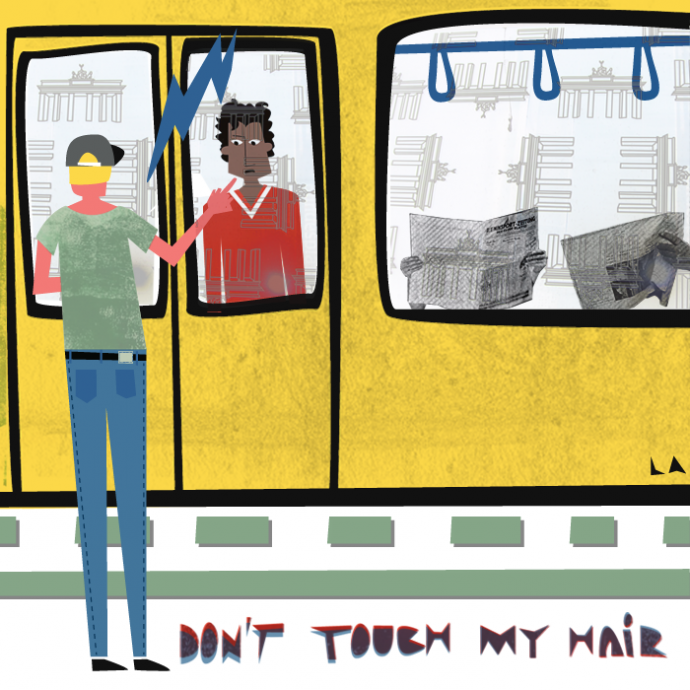Racial discrimination and prejudice against minority groups are prevalent issues worldwide, and whilst individual perspectives and belief systems may have progressed in the last decade, there is still considerable room for growth and acceptance across the globe. Sensa Nostra investigates the notion of racism within Germany through an interview with Stacie Graham, human rights activist and advocate for African American equality.
I am of African American descent. Of course there’s more to it, but it’s the only thing you need to know to understand why I am a victim of racism on a daily basis. Born in Miami, Florida, I braved my adolescence in Birmingham, Alabama, a conservative region in the southeastern United States. I attended a baccalaureate school where I learnt German, and after receiving my diploma I made the transformative decision to move Germany alone at the age of seventeen. In the following years I began my bachelor studies in Heidelberg. I completed my masters and after a few years of work experience I returned to university to complete my doctorate in motivational psychology.
I guess by that point I knew what direction I wanted to take my life in. I think on a micro level I have always been an activist in the way I’ve lived my life, but it wasn’t until my doctorate that I decided to dedicate my career to activism. My shift into German culture was a key influence for me, as I’d previously completely misjudged Germany’s mentality towards different ethnicities. I feel I’ve always had to be an ambassador, simply because I’m targeted by racism. However, I officially launched my human rights website two years ago. Since then I have been involved in seminars and conferences around Europe and have been actively interviewing individuals affected by racism to raise awareness through my website platform. I feel quite privileged to have conducted so many interviews and to have had the opportunity to talk to the people I’ve talked to.
Just like the people I speak with, I also experience racism on a daily basis here in Germany. It stems from the fact that I’m a black American and when people look at me they don’t expect me to speak German. Every day someone speaks English or French to me, judging me instantly upon first glance. People comment on my high level of German skills, also daily, as if it’s something abnormal. And the worst of it all, someone always thinks it’s okay to pull my hair when I’m riding the S-Bahn— that happens quite often. Whether it’s unintentional or deliberate, microscopic comments or racial slurs shouted across the street, it’s racism. All of these actions, most notably the constant invasions of personal space, illustrate a general belief: that boundaries of black women don’t exist, that black women are always available, in some lesser-than-human state, emotionally, physically, and sexually. And that is wrong.
The most extreme experience I’ve ever had was almost being attacked by Neo-Nazis on a regional train in Baden-Württemberg. Initially the group were yelling racial slurs at me. They got off the train and were joined by orhers on the platform. They charged back towards the train in an even bigger mob and, thankfully, the doors closed in their faces. I was quite lucky for that. However, it was in that moment that I realised no one else on the train had moved. No one had said anything. No one had tried to help me. People just watched. They were either too scared to do anything, or they were caught in a sort of group mentality that meant they assumed someone else would handle it.
As horrific as it got outside the capital, I still found the racism in Berlin to be worse than anywhere I had ever experienced, and I have a theory as to why. The city I lived in before Berlin was Munich. Anyone who knows Germany knows it’s kind of an archenemy to Berlin. Berlin is dirty, underground and poor, whilst Munich is rich, clean and upper class. In Munich everyone spoke German to me, so when something inappropriate was said I was able to discuss it in an open and understanding manner. In Berlin, there is a specific mentality amongst the locals who grew up here: they feel as though, since they grew up in such a multicultural city, they already know: they don’t want to be told anything. It’s a double-edged sword, as it seems to actually heighten prejudice and bias in many instances. Consequently, in Berlin, I hear many more negative comments and racial slurs directed at me in passing—even in areas like Kreuzberg and Prenzlauer Berg, where people are assumed to be more understanding, as these areas are less conservative and more diverse. Nonetheless, racism exists in some way everywhere and I have definitely learnt where I’m not welcome—I will never go to Marzahn, Hellersdorf, or certain parts of Brandenburg. But it’s not enough, because just staying away doesn’t stop it.
People will always have their beliefs, ones that become ingrained throughout their upbringings. This was reinforced for me last year at the Raw Foods Festival here in Berlin, when a young child asked his parents “Why is his skin so dark?” referring to friend of mine. The ignorant words that followed were repulsive: “Because he’s not German”.
Being brought up in the US, ethnicity and race relations are topics that you grow up hearing about, especially in the Southeast. I’m not saying there’s no racism in the US; of course there is. However, it’s a part of open discourse, in that it’s been acknowledged and there are several laws in place to address it and develop the country into a more tolerant, unified nation.
What I’ve noticed in Germany is different. It’s not necessarily bad; the country is simply not as developed as others when it comes to race relations and awareness of different ethnicities. It’s all relatively very new and so any discourse on these subjects still has quite a derogatory tone. The German constitution was only altered in January 2000 to allow foreign, long-term residents of Germany and their German-born children to acquire German citizenship. It is no longer your bloodline that defines you as a German citizen. In my eyes, this amendment is at least a step in the right direction.
For Germany to develop further on this frontier, first there needs to be a recognition that racism exists, and also that racism isn’t only limited to East Germany and people who call themselves Neo-Nazis. Racism exists on a very basic level in Germany. In all of the conversations that are had about immigration policy, for example, people are reduced to their language skills; this is also a form of structural racism. In my opinion, there are so many topics where the notion of racial discrimination comes up; however, the word racism is never used because of Germany’s recent history and role in WWII. Quite simply, there needs to be an open discourse on the subject to address it accordingly.
In my fight against racism, I have learnt strength and resilience beyond belief. Any minority could tell you that it affects you differently from day to day. There are days where you can handle it better. Days, where your strength might encourage you to start a righteous discussion, and of course, there are days where you’re just not in the mood—days where removing yourself from the situation as fast as possible seems like the only plausible option. My passion and determination to destroy racism at its core, through education and genuine enlightenment, is what has driven me to start the ‘Don’t Touch My Hair’ platform. It has provided a way for those affected to take a stand in an active yet benevolent manner, because we believe that one racist is one too many.







